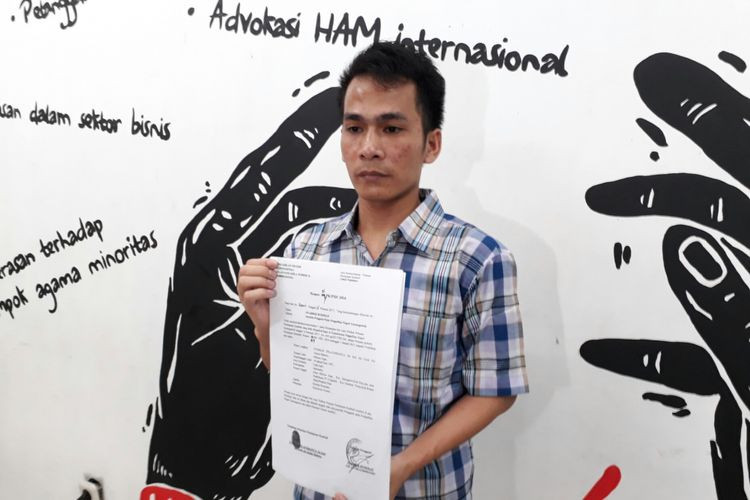Popular Reads
Top Results
Can't find what you're looking for?
View all search resultsPopular Reads
Top Results
Can't find what you're looking for?
View all search resultsKilling the death penalty
One of the main reasons for Indonesia's high level of death sentences is President Joko "Jokowi" Widodo's "zero-tolerance" policy against drugs.
Change text size
Gift Premium Articles
to Anyone
 Former death row convict Yusman Telaumbanua holds a document during a press conference at the Commission for the Disappearances and Victims of Violence (KontraS) office in Jakarta on Tuesday, Aug. 22, 2017, after his release. At 16 years old, he was still an underage child when he was sentenced to death by the Gunung Sitoli District Court in Nias, North Sumatra, in 2013.
(Kompas.com/Robertus Belarminus)
Former death row convict Yusman Telaumbanua holds a document during a press conference at the Commission for the Disappearances and Victims of Violence (KontraS) office in Jakarta on Tuesday, Aug. 22, 2017, after his release. At 16 years old, he was still an underage child when he was sentenced to death by the Gunung Sitoli District Court in Nias, North Sumatra, in 2013.
(Kompas.com/Robertus Belarminus)
A
s a nation that claims to uphold human rights, it is puzzling that Indonesia retains the death penalty in its criminal justice system. The problem with our capital punishment is not just the fact that it is irreversible, but also because of the country’s corrupt system that allows room for miscarriages of justice.
In commemorating World Day Against the Death Penalty on Tuesday, we join human rights groups in renewing our call on the government to abolish the death penalty, not only because the country’s judicial system is prone to mistakes, but also because of human rights violations that many death-row inmates have endured.
Let us take a look at the case of Yusman Telambuana who at 16 years old was sentenced to death by judges in North Sumatra for three counts of homicide in 2013. He was exonerated after a case review filed with the Supreme Court by the Commission for Disappearance and Victims of Violence (KontraS) was granted in 2015.
We should also recall Pakistani drug convict Zulfiqar Ali who was not as fortunate as Yusman. The court sentenced Ali to death in 2005 after what observers described as an unfair trial that saw him go to court without legal counsel. He died in jail in 2018 after struggling with an undisclosed illness, before the execution could take place.
KontraS recorded a total of 27 death sentences between October 2022 and September 2023 alone, in connection with 18 drug-related offenses, seven premeditated murders and two sexual violence crimes. The figure is slightly below the 2021-2022 period, which saw 31 death sentences handed down by district courts.
As of August, there were 428 convicts awaiting execution according to the Institute for Criminal Justice Reform (ICJR).
Hopes were rife that policymakers would remove the death penalty when last year they deliberated the Criminal Code (KUHP) revision that was expected to replace the old law inherited from the country’s former colonial masters.
Passed at the end of 2022, the new KUHP introduced an automatic 10-year probation for convicts on death row to demonstrate good behavior for the possibility of having their sentences commuted. After the probation elapses, the sitting president may reduce the sentence to life or 20 years in prison. The policy will take effect in 2026.
While it is progress, it is too little too early to celebrate. The new Criminal Code keeps the death penalty intact, sadly without any guarantee of a fair trial. Worse still, Indonesia is a party to the Universal Declaration of Human Rights, which protects the right to life and the right to live free from torture or cruel, inhuman or degrading treatment or punishment.
Indonesia is among a few countries that uphold capital punishment, going against the world trend. By 2022, 109 out of 193 member states of the United Nations had completely abolished it.
In Indonesia, ending the death penalty still has a long way to go. The election of a new leader is unlikely to make a difference in this fight against capital punishment.
Amnesty International Indonesia research showed that one of the main reasons for Indonesia's high level of death sentences was President Joko "Jokowi" Widodo's "zero-tolerance" policy against drugs, with drug crimes accounting for 94 percent of all death sentences last year.
Support for the zero-tolerance approach, the rights group said, was partly based on the misguided idea that the death penalty deterred drug-related crimes. Despite the high number of drug convicts sentenced to death, he noted, Indonesia continued to see a growing number of drug users.
Experts have said that efforts to abolish the death penalty in Indonesia have been hampered by the popularity of "penal populism", a process whereby politicians and policymakers devise more punitive policies to win support from voters.
We still have to go the extra mile to remove the death penalty. But seeing neighboring Malaysia end the death penalty for certain crimes, we believe that change will also happen in Indonesia.










